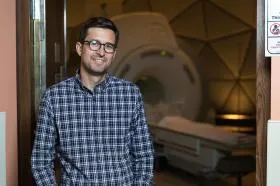Anxiety disorders are the most common mental illness, affecting about 40 million adults in the United States. The Department of Psychological Science at Northern Michigan University is researching a nontraditional approach—a mobile phone app—to treat negative emotional symptoms related to anxiety. NMU’s Cognitive x Affective Behavior & Integrative Neuroscience (CABIN) Lab is seeking participants for a six-week study involving cell phone use. A National Institute of Mental Health grant is supporting the project.
The research seeks to determine if attention bias modification (ABM) training through cell phone use is an efficient treatment for anxiety. The study will assess the extent to which ABM changes the structure of the brain and how these structural changes relate to the effectiveness of ABM training.
“The use of ABM at home through a mobile phone app is uncommon,” said Joshua Carlson, CABIN Lab director and psychology professor Joshua Carlson. “Previous research on ABM and anxiety has not explored the structural changes in the brain that follow ABM training and how these changes relate to changes in anxiety symptoms.”
Neuroimaging using MRI and Electroencephalography (EEG) will be conducted before and after the training. The lab will pay up to $65 to NMU students or community members who are 18-42 years old to participate. They must be right-handed in order to reduce the potential influence of handedness on the results.
Carlson is conducting the research with help from students, who are assisting in collecting, analyzing and presenting data. Graduate student Jeremy Andrzejewski said he came to NMU explicitly to work for Carlson on the project.
“I find this area of research to be important because I have seen how anxiety disorders impact people in my life that are close to me, and any efforts we can make to provide possible mitigation of these negative symptoms is personally important and worth investigating,” Andrzejewski said. “In particular, my research interests focus on how we can utilize neuroimaging techniques to help determine efficacy of possible anxiety treatments. I am also interested in using neuroimaging techniques in an effort to elucidate the neuroanatomical mechanisms that contribute to anxiety and mood disorders. My thesis involves using EEG to help aid this investigation of ABM efficiency.”
Andrzejewski said the opportunity provides hands-on laboratory experience he would not have had elsewhere.
“In particular, the ability to take pre- and post-measures and the ability to combine MRI with EEG in order to look at aspects of both functional and structural changes within the brain,” he said. “This combination provides a new level of insight and permits me to expand my knowledge of EEG and address some of the limitations with this method of imaging with MRI data.”
For further information or to sign up for the study, Joshua Carlson can be reached at cabin.lab@gmail.com.

